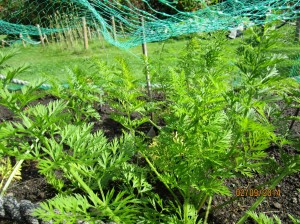Now that we are coming to harvest time we will shortly be able to measure the crops in the Really Wild Veg trials to see how they have performed. Obvious things to measure are yield and disease resistance, but a fun part of the trial is tasting the crops to see whether there is any discernable difference in flavour between the wild plants and their domesticated cousins. Last year the trials consistently demonstrated stronger flavours in the wild plants.
Harvesting of the trial plots in Edinburgh at the Botanics, Hermitage Vegetable Garden and Redhall Walled Garden will happen on the 10th of September. The Cruickshank Botanic Garden trials will continue for a little longer as the seeds were planted later.
At the Botanics there has been relatively little incidence of pests or disease, with the only notable case being a localised outbreak of scaly aphid on the heritage kale. Josh at Cruickshank Botanic Garden experienced white spot fungus on some heritage kale plants, but after removal of the affected leaves the plants seem to be recovering well.
As noted in an earlier blog Josh has expanded the trials to explore additional questions about how well the different plants in the trial cope with weed competition and what benefit companion planting can have for the control of pests. In plot 6 Josh is using radish as a natural deterrent against carrot root fly, which is a very common problem in carrots.
The weather has not been entirely kind this summer and Josh has last week resown a crop of Chinese radish, ‘Dragon’ F1 hybrid, that had been lost to rot after the strong winds and rains three weeks ago – the aftermath of the USA Hurricane Berth.
A particularly interesting outcome of the trials will be the nutritional analysis being carried out by the Rowett Institute of Nutrition and Health at the University of Aberdeen. Samples from last year’s trials are being analysed at the moment and the first results for the radish trial show significantly increased levels of health-promoting phytochemicals in the wild plants compared to the domesticated plants. This was the anticipated result, but very few studies have looked at the levels of these beneficial chemicals across a range of plants including crop wild ancestors. What this result shows is that domestication has resulted in a reduction of chemical compounds that are now known to be linked to reduced risks of cardiovascular disease and cancer. This raises the possibility that new varieties of crops with chemical profiles that maintain our health could be developed using the wild ancestors. Keep checking the blog as we hope to be posting more details of these exciting results soon.
Next week on Thursday 11th of September there will be a drop-in event at Cruickshank Botanic Garden showcasing the Really Wild Veg project. If you want to find out more about the project and the reasons why the wild ancestors of our crops matter do come along to the tent at the Botanical Garden between 10am and 4pm. Entry to the Garden is free, as is the event itself.

